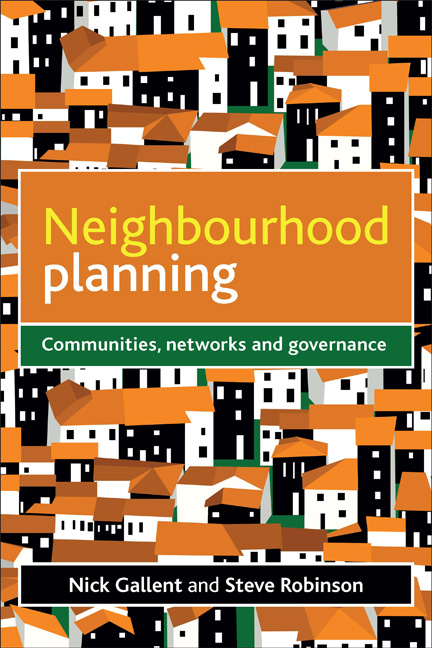Book contents
- Frontmatter
- Dedication
- Contents
- List of figures, images and table
- Abbreviations
- Acknowledgements
- Authors’ note
- Part One Democracy, planning and localism
- Part Two Capacity building and community-based planning
- Part Three The interface with policy actors
- Part Four Neighbourhood planning, leadership and democratic renewal
- References
- Index
four - Community-based planning and plans
Published online by Cambridge University Press: 07 September 2022
- Frontmatter
- Dedication
- Contents
- List of figures, images and table
- Abbreviations
- Acknowledgements
- Authors’ note
- Part One Democracy, planning and localism
- Part Two Capacity building and community-based planning
- Part Three The interface with policy actors
- Part Four Neighbourhood planning, leadership and democratic renewal
- References
- Index
Summary
The experience of producing and using parish plans in England provides the empirical focus of this book. It is this experience, along with the community governance context for parish plans, that is held up as a mirror to the emerging process of neighbourhood development plan production, introduced at the end of this chapter. It is also this experience that exposes some of the frailties of democratic renewal rooted in networked governance, and the realities of community groups struggling to make their voices heard in the shadow of growth and the context of apparently overwhelming strategic priority. Here, we introduce some of the procedural issues that are dissected in later chapters, including the way in which community-based plans may be used to inform local planning policy. The relationship between plans drawn up by community groups and the plans produced by policy actors is an issue dealt with in some detail in Chapter Nine. The basic question of connectivity (to formal policy) has been a major concern for parish plans and will continue to influence thinking on the form, content and production of neighbourhood development plans. There is much that can be carried forward from past experience of community-based planning and plans and some of this is introduced in this chapter, which outlines the evolution of parish planning in England.
Parishes and parish planning
Parishes are the smallest units of government in England, originating from the Local Government Act 1894 (Jones, 2007, p 230). They were given legal recognition and became ‘tiers of small-scale local governance separate from the church and ecclesiastical parishes’ (2007, p 230). They were originally intended as a form of specifically rural governance. Under the Local Government and Rating Act 1997, ‘a community at the village, neighbourhood, town or similar level beneath a district or borough council in England can demand its own elected parish or town council’. Roughly 200 additional parish councils have been created since 1997, although they remain largely a rural phenomenon. The impetus to create more of these councils, extending them to urban areas, was provided by the Local Government and Public Involvement in Health Act 2007, section 94.
- Type
- Chapter
- Information
- Neighbourhood PlanningCommunities, Networks and Governance, pp. 37 - 50Publisher: Bristol University PressPrint publication year: 2012



